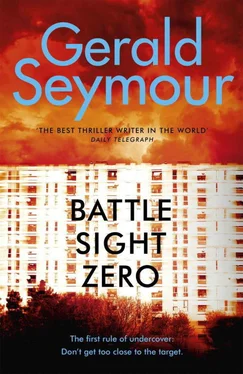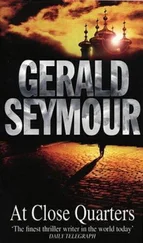And he cursed it.
In the gaol, some mornings before dawn, he would hear the procession of boots and the locking and unlocking of doors, and the little whimpering cries of a condemned man, and the rattle on flagstones when a chair was kicked away. He cursed the weapon, thought it damned. They would take him out of his cell, lead him into a yard, hoist the noose over his head, lift him on to a chair, and let him swing. The rifle was carried in front of him and silently, he swore at it. His eyes misted in tears, he could no longer see the oak trees that grew around his home. He had no answer from the dulled and dirt-cased carcase of the rifle.
He’d been working, done two deliveries, and was late for their rendezvous. She looked sourly at the face of her watch, and he tried to explain that he was late for her because of a problem with the number of cement bags that needed dropping off. Might as well have told the moon. She had been there fifteen minutes.
Andy apologised. She had shrugged. Andy told her about the volume of traffic. A deep breath, and her eyes were hard on him. Had he squared it?
He had. He was starting to tell her that they were not too pleased at him swanning off, and that it meant the driver roster was going into a melt, and… he had done it, was ready to go. She oozed relief. Was that the reaction of a girl when her boy said he could make a journey all the way to the south of France, a sunshine holiday thrown in. The boss had wanted to know what sort of a trip it would be; he said it lightly and with some irony. She flared. None of their business. Nothing that involved them. He sought to calm her.
Andy said, ‘It’s all going to be fine. I have the time off from work. It’s agreed. I told them I was dead lucky, told them I was going away across France with a super girl, a really pretty one – don’t blush, it’s the truth – and we had some family business of yours to settle, and I was going to drive. Hey, Zed, I tell you the truth, all the guys are just dead jealous. It’s going to happen, and I’ve fixed for the vehicle, my motor. The mechanics in the depot will go over it tomorrow, tune it up a bit. It’s a hell of a drive and won’t be the newest lady on the autoroute. They’ll get it going and smooth, do a good job.’
It was a good little speech and it satisfied her. She’d leaned across the width of the table and had kissed him on the lips. Not lingering but better than usual. She was good at rationing affection, like it came with coupons: he was rewarded because he had put in place what was demanded of him.
She would see him tomorrow. Where would he be when the car was fixed? He said where he’d be, at the Hall of Residence. She didn’t want that. Too public, and too much CCTV with lenses that recorded faces and registration plates. There was a park half a mile away from the Hall. He wanted to know when they would be on the road and going south. Why did he want to know, why?
He sensed she was primed, had a crib sheet of questions to ask and answers she was to get. He was smiling, he was the happy boy, and he thought her tight as a damned bowstring which he had not seen before. He needed to know the time they’d cross the Channel, or travel under it, so that the tickets could be booked. She hesitated.
Zed said, ‘Not your problem, Andy. I’ll do that. I’ll fix that… What’s the registration? They’ll want it for the booking. I can do that.’
‘Of course you can. And pay for it? I think I should… you want to pay, your shout – I won’t argue.’
And did not argue, and would have told anyone who’d asked that, in his view, she would be hard put to buy a ticket for a tram in the city, or to use the automatic vendor for the train going over the Pennines and back home. He told her the make and the year and the colour and the registration and she wrote them carefully on the back of a notepad. He let his hand rest on her wrist… so innocent and so vulnerable, and quite pretty, and screwed up, and not knowing how it would be. Join the club, my love, he might have said. He gazed at her, looked earnest, and honest. He’d learn, all in good time, what the family business was, why she needed a simple boy – with a Labrador’s devotion – to drive her the length of France and back. Interesting times.
The winds came off the Sahara and climbed above the mountains and gathered force when they came back down to cross the beaches and the fishing villages and reach the western Mediterranean. The freighter was the Margarethe . She flew a Dutch flag of convenience, was registered in Rotterdam, but at that point her connections were severed. Her master and navigation officer, along with the engineer, were Egyptian; her deck crew and mess stewards Tunisian. The journey she had set out on was some 900 nautical miles and she rolled and rocked in the swell that the wind stored up, and would make poor time on her journey towards the great bite that formed the coastline of southern France.
The captain was resting in his cabin. He was spread-eagled on the bunk bed awarded him, with a decent mattress and good storage space underneath for his personal baggage. Behind his rucksack and his grip bag was the package. It had been well wrapped up but, from its length and its general shape, though hard edges were disguised by the bubble-wrap, he had a fair idea of what it was: and only one. The looted antiquities that his boat carried, to be sold on the clandestine market to high-value collectors – in secrecy – were of far greater value than one rifle. He had been told that future cargo would be put his way, all of it paid for in the crisp currency of used American dollar bills, if this mission was performed satisfactorily. He had met a fearsome elderly man, of short stature and with a thick and blunt-trimmed grey beard, who had worn dark glasses even though the light on the quayside at Misrata was pitiful. He had thought it in his interests to perform satisfactorily, or at a higher standard, but wished – a little – that the introduction had not been made. The Margarethe pitched in the swell, rolling him from one side of his bunk to the other, and they made slow progress. It was extraordinary to him that one rifle was an important piece of cargo.
A tension weighed heavy in the air under the Mediterranean sun.
They all recognised it, including Karym. At nineteen years old, with a haircut that represented the fashion of the day – styled on the scalp and shaved close at the sides – wearing cast-off clothing from the big store in the shopping mall across the valley where his sister worked and had concessions, and with a weak, diseased arm, carrying a lit cigarette – permanent, Karym had good antennae for approaching danger. Not for him, for another.
He sat among the huge quarried rocks that blocked the main entrance to the La Castellane project, making it impossible for cars to get inside and spill out their passengers. Who might have wanted to? The police… rivals from other projects. His damaged left arm was the victim of childhood polio. Karym was the younger brother of Hamid, which mattered in the jungle life of the project. His elder brother treated Karym with contempt, insulted and abused him but looked after him. Not to have had such protection, in a place like La Castellane, and to be crippled by a useless arm and unable to fight back would have been fatal. Not to be able to fight, to wield a knife, was weakness, exploitable: Karym had heard stories of the fights between rats, a pair placed in a high-sided galvanised tub, and sticks used to annoy, then goad them into fighting – to the death. Only one rat could survive the combat in front of a raucous crowd of youths in La Castellane, but in its moment of victory it would be clubbed to death, or have a cross-terrier set on it. Karym was protected because his elder brother had power, and exercised it. Karym had no power, no influence, was an impediment and a burden, and his intelligence was seldom asked for.
Читать дальше












